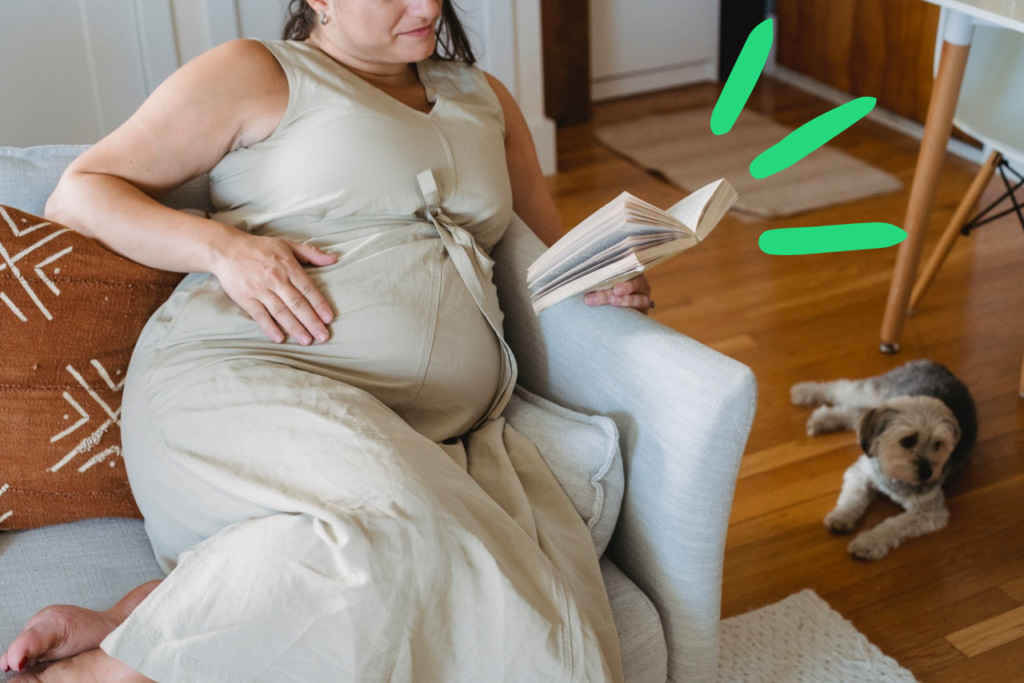Though the much-predicted COVID baby boom is yet to materialise nationwide, we have to assume that since you’ve arrived on this page, you’re bucking the trend and welcoming a new addition into the family sometime this year or early next.
Congratulations! What a wild, emotional and invigorating ride you’re in for. And that’s before your baby is born and you take on a new and all-encompassing responsibility for the next 18 years (and the rest). Though the future is uncertain, for now, let’s focus only on what you can control; for those expecting, here are some helpful pregnancy tips.
A Pregnancy Calendar And Journal
When you are in the early stages of pregnancy, it can feel surreal that you’re carrying a baby. One wonderful way to connect with your baby, and appreciate exactly what is happening inside you, is to follow a pregnancy calendar to give you some perspective on what is going on.
Did you know that at 11 weeks pregnant your baby is sprout sized? Following these little milestones and fascinating facts will help you feel a sense of control over proceedings, and bring about a bonding with your baby which is one of the most cherished connections life can give.
Alongside following a pregnancy calendar, consider keeping a pregnancy journal. Writing down all these milestones and memories is a great way to preserve them. Moreover, journaling is a therapeutic act, allowing you to make sense of how you feel and your thoughts, which can help massively throughout your pregnancy journey.

Write A Birth Plan
A birth plan can be one of the helpful ways to ensure a successful pregnancy. It’ll allow you to prepare yourself for having a baby, making the entire pregnancy experience less stressful. To write a birth plan, you should consider things such as the people you want to be present with during the delivery, the procedures you like to avoid, the positions you wish to take during childbirth, and other important stuff. Also, you can include taking childbirth classes in your birth plan. It’ll enable you to feel more prepared for labor and delivery.
Thankfully, there are many training programs out there that aim to provide you with a transformational birthing experience. For instance, The Calm Birth School Hypnobirthing training program could help you get through childbirth with ease, promising less stress throughout your pregnancy journey.
Eating When Pregnant
What you should and shouldn’t eat when pregnant is a minefield of sometimes contradictory, often confusing sentiment and suggestions. “That’s not how we did it in my day”, and all that…
Every pregnant woman will experience unsolicited advice more than once during her pregnancy. This barrage of conflicting tips awaiting a newly pregnant women can be confusing, and when the craving to eat gherkins covered in strawberry jam hits, it can be difficult to know who to trust.
Some things we do know, however, is that eating for two is a myth and you should definitely avoid raw eggs, due to the risk of salmonella poisoning. There is a lot to cover on this subject and if in doubt, speak to your midwife.
However, if you’re looking for a simple summary of some of the tips out there, then we’ve got some helpful advice from experts on eating when pregnant that we’ve collated on here.

Supplements And Vitamins
It’s generally recommended that a few vitamins and supplements are a good idea during pregnancy. Many women, according to Dr Gudi from Fertility Plus, require an iron supplement, while others choose a multi-vitamin for the whole body. However, he warns that it is essential that you speak to your doctor before taking anything new. Not every mother-to-be needs extra iron and people with normal iron levels can usually get enough from their diet.
Indeed, the NHS say that eating a healthy, varied diet during pregnancy will help you get most of the vitamins and minerals you need. However, they add that “when you’re pregnant, or there’s a chance you might get pregnant, it’s important to also take a folic acid supplement.’’
It’s recommended that you take 400 micrograms of folic acid every day – from before you’re pregnant until you’re 12 weeks into pregnancy. This is to reduce the risk of problems in the baby’s development in those early weeks.
The NHS also recommends you take a daily vitamin D supplement. They warn not to take cod liver oil or any supplements containing vitamin A (retinol) when you’re pregnant as too much vitamin A could harm your baby.
Stay Active
Exercise plays a crucial role in maintaining your health during pregnancy. When you stay active, you can lower your stress level, enhance your mood, and improve your blood circulation. Hence, if possible, start taking pregnancy exercise classes to keep yourself active. You can also try yoga, swimming, or walking for at least 15 to 20 minutes daily with moderate pacing. However, before engaging in any physical exercises, consult your doctor first. They know exactly which activities are suitable and which aren’t for your body. If you’re allowed to do some exercises, it’s best to aim for at least 30 minutes but avoid overdoing it to ensure more positive results.

Invest In A Book
There are a million pregnancy books out there, but rather than getting the traditional science-based, advice-heavy one, why not invest in a good novel or memoir about the experience of motherhood instead?
Pregnancy books are full of facts and, while informative, can sometimes make you worry. A good bit of literature, on the other hand, can help you relax while still being informative.
Writing in the Guardian, Francesca Segal, author of Mother Ship (Vintage, £8.99), recommends:
- ‘Making Babies’ by Anne Enright
- ‘Operating Instructions: A Journal of My Son’s First Year’ by Anne LaMott
- ‘A Life’s Work’ by Rachel Cusk
- ‘Hey Yeah Right Get a Life’ by Helen Simpson
- ‘A Blind Man Can See How Much I Love You’ by Amy Bloom
- ‘Where’d You Go, Bernadette’ by Maria Semple
If you’re looking for a more traditional pregnancy book, then these titles may help you navigate this amazing time, arming you with a little more knowledge:
- ‘The Modern Midwife’s Guide to Pregnancy, Birth and Beyond’ by Marie Lousie
- ‘Nobody Tells You: Over 100 Honest Stories About Pregnancy, Birth and Parenthood’ By Becca Maberly
- ‘Baby Bomb: A Relationship Survival Guide for New Parents’ by Kara Hoppe and Stan Tatkin
- ‘Expecting Better: Why the Conventional Pregnancy Wisdom Is Wrong and What You Really Need to Know’ by Emily Oster
Read: 6 simple ways to prepare for a new arrival in the family
And finally, if you are looking to the future and beyond your pregnancy, and are keen to keep fit after the birth of your baby, then here’s how to get back in shape after pregnancy and birth.
*This article is not intended to replace medical advice, diagnosis or treatment given by a qualified health professional. Instead, this article only provides information, not advice. For any medical enquiries, always consult your GP, midwife, postpartum nurse or specialist health professional first*
